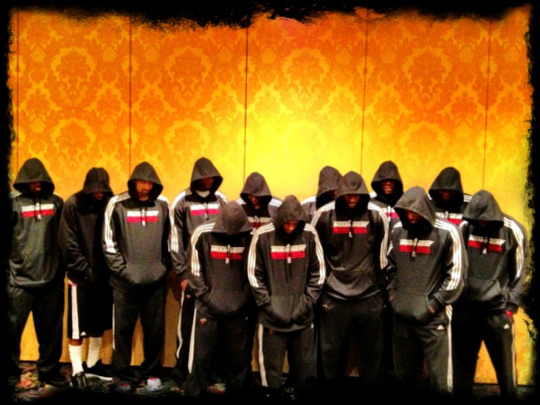
Image Credit: plus.google.com
At the end of my last post I promised to examine Brad Paisley and LL Cool J's controversial duet "Accidental Racist" in light of Paisley's 2011 "Camouflage" homage. This follow-up post offers that analysis as well as some context from Paisley's pop-country contemporaries and a recent national dialogue about race.
Sharing its name with the garb of hunters and soldiers, Paisley's lighthearted single from the album "This is Country Music" sounds, at first blush, like it would be anything but progressive. You might think only a select crowd could rally around a song that celebrates an aesthetic so closely associated with guns and stealth. But if we listen closer, the song stretches the application of camouflage into unexpected places where it creates an atmosphere of social inclusiveness. Let's see how this plays out.
In the first verse of the song an un-"cool" kid named Kevin makes a successful bid for popularity by pulling up to his high school parking lot with "his entire Chevy Cavalier" painted camouflage. The crowd cheers and Paisley exclaims, "camouflage - it disappears when it pulls out of his garage!"
Camo-bedecked high schoolers show up in the next verse too. Paisley croons,
I asked Jenny to the prom and her mom knew how to sew
So she mad a matching tux and gown from Duck Blind Mossy Oak
We took pictures in the backyard before we went to the dance
And the only thing that you can see is our faces and our hands
The final quatrain moves into a different register, away from teenagers and their efforts to fit or blend into their social environments to symbols of regional and national identity. The song slows down as Paisley concedes, "well the stars and bars offend some folks and I guess I see why." His reluctance to denounce the Confederate Flag outright is puzzling. But perhaps this is the kind of "tact" Paisley needs to use in order to get his largely southern, white fan-base to buy into the alternative flag he wants to propose:
Nowadays there's still a way to show your southern pride
The only thing as patriotic as the old red white and blue
Is green and gray and black and brown and tan all over too
Given the way camouflage functioned earlier in the song, as an invisible social glue that attracts even as it allows anxiety-producing social objects (outfits for prom, the car one drives to school) to fade away, we're encouraged to read the camo-colored flag as performing a similar kind of social function. Characterizing camouflage as his "favorite color" and adding that it is "designed by Mother Nature and by God," the singer makes the humorous claim that it is naturally occuring and divinely inspired. But the joke may have a deeper significance. By refering to camouflage as a single color that comprises "black and brown and tan" shades, the song also advocates for replacing old racist symbols of "southern pride" with symbols of a racially and ideologically diverse place. In the far-fetched, humorous universe of the song, camouflage is the means by which to reject exclusivity in favor of inclusion.
Paisley's struggle to find an acceptable outlet for "southern pride"--which he says is clouded by "southern blame" in "Accidental Racist"--may seem like a strange fixation. But it's a theme that is dear to Nashville country and has been handled in far less considerate or creative terms. Take for instance Eric Church's single "Homeboy," released the same year as "Camouflage." Adapting the biblical story of the prodigal son, the singer pleads with the title character--presumably his little brother--to return home from his wayward life on streets. Like Paisley's songs, Church's tune uses racialized clothing items and physical appearance to signal racial difference. But unlike "Accidental Racist," Church's song doesn't express difference through white and black characters; instead it sets up a strong antagonism between American farm life and hip-hop-influenced, urban culture.
Let's take a quick look at the lyrics. The singer's initial appeal to his brother mocks the urban style adopted and/or popularized by black hip-hop artists:
You were too bad for a little square town
With your hip-hop hat and your pants on the ground
Heard you cussed out mama, pushed daddy around
before you tore off in his car
Here you are running these dirty old streets
Tattoo on your neck, fake gold on your teeth
Got the 'hood here snowed, but you can't fool me
We both know who who you are
Later on in the song the singer counters the gold teeth and the baggy pants of the "'hood" with fixtures of a white, small-town existence: hard work, cold beers, hay bales, and trucks by the lake.
Even though LL Cool J and Brad Paisley work with the same sartorial imagery (Cool J tells us his pants are "saggin'") they actively reject the "us versus them" mentality of a song like "Homeboy." They do this by invoking stereotypically black or white clothing items (cowboy hats, a Skynyrd t-shirt, saggy pants, do-rags, and gold bling) and, without disparaging them, acknowledging that these are proverbially just the cover of the book. Paisley's line,
I try to put myself in your shoes and that's a good place to begin
But it ain't like I can walk a mile in someone else's skin,
captures the way the song treats dress versus more permanent forms of racial identity. Walking in someone's shoes, or in their do-rag or cowboy hat, isn't a meaningless gesture and neither should these objects be left out of a conversation about race. But "Accidental Racist" also refuses to absolve us of the ugliest kind of discrimination--not just judgment based on clothing, but judgment based on skin color.

Image Credit: www.cbsnews.com
If there's any doubt about whether clothing or appearance is a legitimate place to start a dialogue about race, just recall the murder of Florida teen Trayvon Martin that occured just over a year ago and the national "hoodie" movement it inspired. If anything LL Cool J and Brad Paisley do well to remind us that appearance, whether it is racial or cultural, still triggers prejudice and fear. How can we deny the emotional basis of a simple wish like this, "Just because my pants are saggin' doesn't mean I'm up to no good / You should try to get to know me, I really wish you would"?
Recent comments
2 years 29 weeks ago
2 years 44 weeks ago
2 years 44 weeks ago
2 years 50 weeks ago
3 years 4 weeks ago
3 years 4 weeks ago
3 years 4 weeks ago
3 years 6 weeks ago
3 years 6 weeks ago
3 years 6 weeks ago